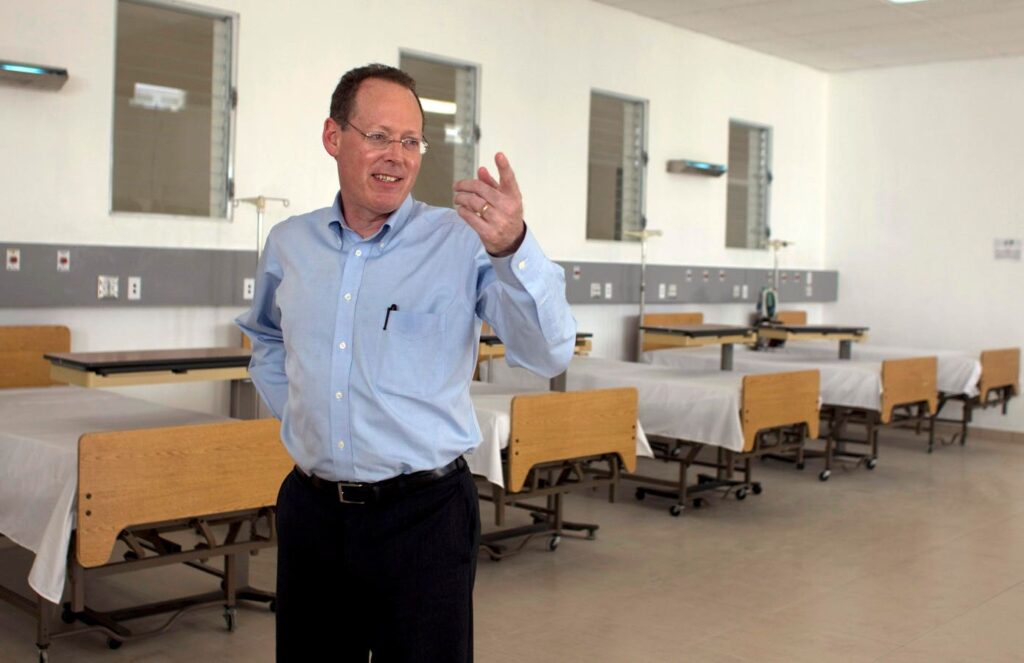Yesterday marked two years since Paul Farmer died in Rwanda at the age of 62. Mr. Farmer is a physician and anthropologist whose notable work spans multiple fields, including infectious diseases, medical anthropology, and global public health.
The Harvard Gazette reported that last November, Harvard Medical School held a symposium to honor Farmer and reflect on the impact his work has had on the world. The symposium can be viewed here.
Mr. Farmer's impressive career began when he co-founded Partners in Health, Inc. with a mission to provide quality care to poor patients and people living in remote areas. Since the early 1990s, Partners in Health has expanded to countries in Africa and Latin America.
Madhukar Pai, Canada Research Chair in Epidemiology and Global Health at McGill University, pointed to Farmer's significant impact around the world. In addition to establishing hospitals in Rwanda and Haiti, Farmer helped bring lifesaving HIV and tuberculosis drugs to patients in developing countries through community-based care efforts.
Farmer embodied the spirit of humanized global public health. Although his vision was altruistic, he believed that what he was doing was of mutual benefit to poor and rich countries alike.
In 2020 and 2021, Farmer worked on coronavirus-related work in the United States and abroad. And as he suggested, if we've learned anything from the COVID-19 pandemic, it's that the phrase “we're all in this together” is not an empty slogan. . By their very nature, infectious disease pandemics connect us all as a global community. The virus is transmitted from person to person and then from one country to another through international travel. No country or region is unaffected.
Arthur Kleinman, a Harvard professor specializing in medical anthropology, psychiatry, and global public health and social medicine, considered Farmer a mentor. What was impressive to Kleinman was Farmer's dedication to patient-centered care in the most urgent situations, wherever he set foot. In an article published yesterday, Kleinman wrote that Farmer believes that “the therapist's moral responsibility is to step into the patient's experience and be there for them in their worst moments with empathy, expertise, compassion and care.” “Yes,” he wrote.
From the tropics to global public health
Originally, global public health was called “tropical health.” To this day, remnants of the past remain in the names of certain organizations. For example, the London School of Hygiene and Tropical Medicine. However, tropical heather hints at the colonial context of health care for the subjects of Western rulers. When the European powers finally left their colonies, the field's name changed to “international health” and, over time, “global health.”
Regardless of the name given, people in this field have often viewed their work in terms of constraints. In other words, what is the best thing we can do with our limited resources? But Mr. Farmer did not share this utilitarian view. Rather, he asked, what is possible given the local “biosocial” context that explains the social, economic, and political dimensions of health, disease, treatment, and healing? Farmers pushed the boundaries and refused to accept lack of resources as a reason why the poorest people did not have access to technically adequate health care. He has repeatedly demonstrated that needed medical technology can frequently be found and utilized in multiple resource-scarce settings.
Nevertheless, it was clear to him that newer and better drugs were needed to combat diseases that primarily affected developing countries. Mr Farmer called for more research and development targeting the most deadly infectious diseases such as HIV/AIDS, malaria and tuberculosis, but also ignored tropical diseases such as cholera, lymphatic filariasis and river blindness. did.
Severely restricted commercial prospects in developing countries initially prevented R&D funding from flowing to the “big three” (HIV/AIDS, malaria, and tuberculosis) and NTDs. Twenty years ago, this gradually began to change. Governments in wealthy countries have begun to devote more resources to these diseases, including by introducing regulatory incentives such as tax credits and priority review vouchers to encourage research and development funding. Finally, philanthropic organizations such as the Bill & Melinda Gates Foundation have poured hundreds of millions of dollars into NTD projects. At the same time, we established public-private partnerships, such as the Medicines for Malaria Venture, to address specific disease areas.
What ensured this was the relatively large amount of R&D funding invested in drug development for HIV/AIDS, malaria, and tuberculosis. Then, in the 2000s, inspired by Farmer et al.'s research, Novartis realized that donating its antimalarial drug Coatem (artemether) was enough. /lumefantrine) is not enough. There had to be boots on the ground, so to speak, to get properly formulated medicines to where they were needed most.
Novartis and Medicine for Malaria Ventures have teamed up to develop Coatem Dispersible, a new formulation specifically designed to meet the specific needs of children with malaria. In addition, Novartis has partnered with the World Health Organization to deliver hundreds of millions of Coatem treatments (75% for pediatric formulations and 75% for adults) to malaria patients in developing countries, with support from local supply and logistics, training and education programs. 25%).
Four years ago, Mr. Farmer “founded the Bill & Melinda Gates Foundation, which invested in discovery and development, the President's Emergency Plan for AIDS Relief, and the Global Fund to Fight AIDS, Tuberculosis, and Malaria, which invested in health care delivery. ” he wrote. , provides a blueprint for global health equity. Whether we look at cholera, lymphatic filariasis or malaria, the roadmap for the future of tropical medicine and hygiene is the same. It's about connecting scientific discovery to product development and, most importantly, to an equitable delivery strategy. ”
Farmer left behind a “generational legacy” that forever changed the way we view global public health. His foresight has enabled him to transform a top-down approach to medical assistance into a localized one that works with local governments, government agencies, and medical professionals to deliver health care to the poorest parts of the world. I did.
follow me twitter.


